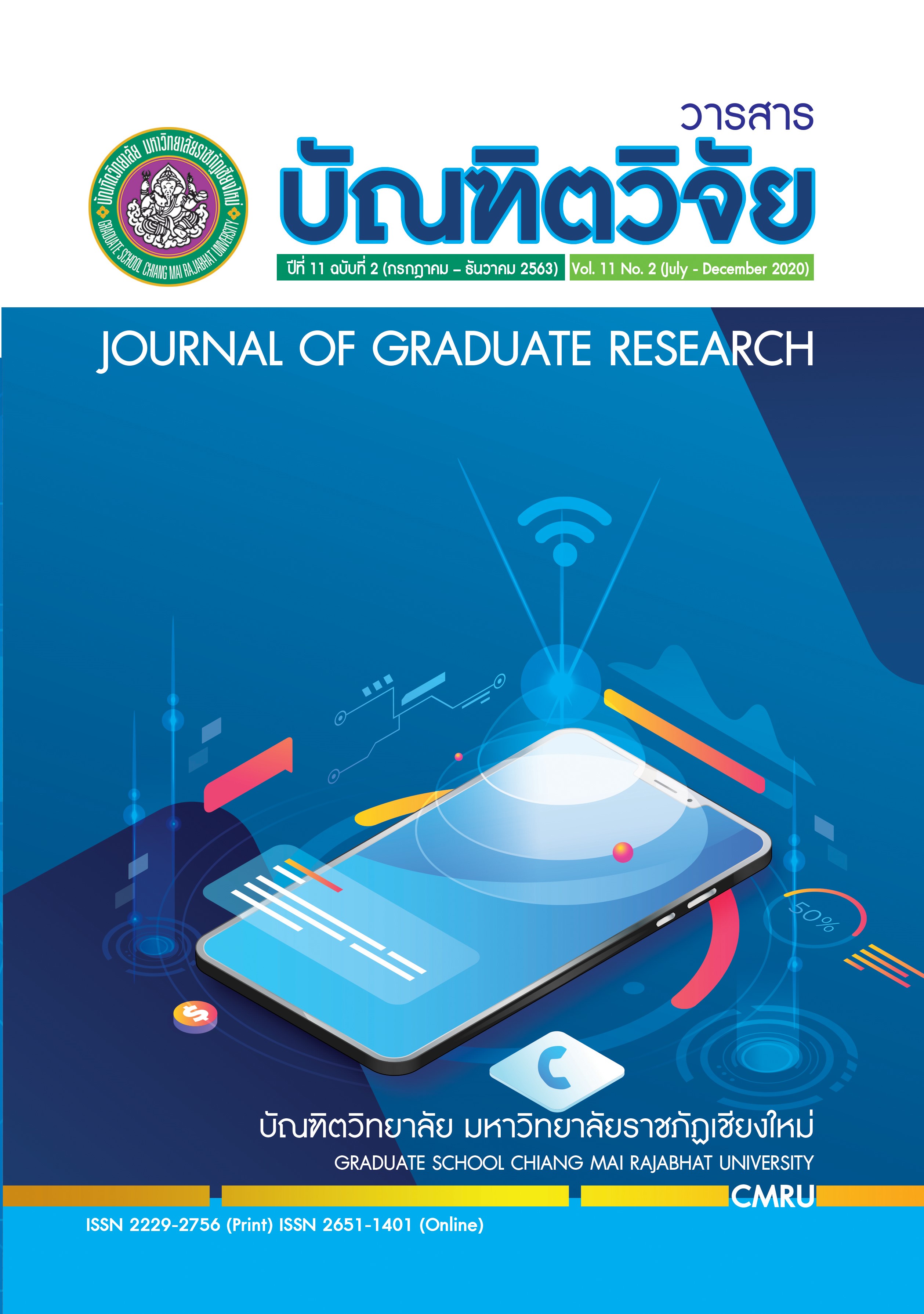ผลของกิจกรรม PEER FEEDBACK ผ่าน CANVAS LMS ต่อการพัฒนาความสามารถการเขียนภาษาอังกฤษของนักศึกษามหาวิทยาลัยปัณณาศาสตรา
Main Article Content
บทคัดย่อ
การวิจัยครั้งนี้มีวัตถุประสงค์เพื่อ ศึกษาผลของการใช้กิจกรรม Peer Feedback ผ่าน Canvas LMS เพื่อพัฒนาทักษะการเขียนภาษาอังกฤษของนักศึกษามหาวิทยาลัยปัณณาศาสตราและศึกษาความคิดเห็นของนักศึกษาที่มีต่อกิจกรรม Peer Feedback ผ่าน Canvas LMS กลุ่มตัวอย่างคือ นักศึกษามหาวิทยาลัยปัณณาศาสตรา (Pannasastra) ประเทศกัมพูชา จำนวน 54 คนที่ลงเรียนวิชา English for Academic Purposes โดยการคัดเลือกแบบเจาะจง แบ่งกลุ่มตัวอย่างเป็นกลุ่มทดลองและกลุ่มควบคุม กลุ่มละ 27 คน เครื่องมือที่ใช้ในการเก็บข้อมูลประกอบด้วย 1) แบบทดสอบก่อนเรียนและหลังเรียน 2) แบบสอบถาม และ 3) แบบสัมภาษณ์กึ่งโครงสร้าง วิเคราะห์ข้อมูลโดยหาค่าเฉลี่ย ส่วนเบี่ยงเบนมาตรฐาน และ t-test
ผลการวิจัยพบว่า กิจกรรม Peer Feedback ผ่าน Canvas LMS มีผลเชิงบวกต่อความสามารถในการเขียนภาษาอังกฤษของนักศึกษาใน 3 ด้าน ได้แก่ 1) การเพิ่มแรงจูงใจ 2) การสร้างความตระหนักต่อไวยากรณ์และการสะกดคำ และ 3) การจัดการสิ่งสนับสนุนในชั้นเรียนและพื้นที่การเรียนรู้ด้วยตนเองของนักศึกษา ดังนั้นกิจกรรม Peer Feedback เป็นประโยชน์สำหรับการเรียนการเขียนภาษาอังกฤษโดยเฉพาะในบริบทของการเรียนภาษาอังกฤษเป็นภาษาต่างประเทศ
Downloads
Article Details
เอกสารอ้างอิง
Baepler, P. (2015). The Canvas learning management system: Instructor and student experience. Center for Educational Innovation, University of Minnesota. Retrieved from https://it.umn.edu/sites/it.umn.edu
Boase-Jelinek, D., Parker, J. & Herrington, J. (2013). Student reflection and learning through peer reviews. Educational Research, 23(2), 119-130.
Bun. T. (2010, February 10). The importance of speaking English. The Phnom Penh Post. Retrieved from https://www.phnompenhpost.com/lift/importance-speaking-english
Canvas. (2019). How do I use peer review assignments in a course? Retrieved from
https://community.canvaslms.com/docs/DOC-10256-4152719640
Chang, C, Y. (2016). Two decades of research in L2 peer review. Journal of Writing Research, 8, 81–117.
Crossman, J. M., & Kite, S.L. (2012). Facilitating improved writing among students through directed peer review. Active Learning in Higher Education, 13(3), 219-229.
Fournier, J., Cruz, S., & Roberts, K. (2018). Canvas 2017: Evaluation report: Academic experience design & delivery, information of Technology University of Washington. Retrieved from https://itconnect.uw.edu
Igawa, K. (2008). English language and its education in Cambodia, a country in transition. Shitennoji University Bulletin, 46, 343-369.
Ismail, N., Hussin, S., & Darus, S. (2012). ESL tertiary students' writing problems and needs: suggested elements for an additional online writing program (IQ-Write) for the BEL 311 course. International Journal of Learning, 18(9), 69-80.
Irvine, A. K. (2015). Increased social connectedness through digital peer learning. Retrieved from https://www.instructure.com/canvas/pdf/social-connectedness
Johnson, A. M., Jacovina, M. E., Russell, D. E., & Soto, C. M. (2016). Challenges and solutions when using technologies in the classroom. Adaptive educational technologies for literacy instruction. New York: Taylor & Francis.
Kurihara, N. (2017). Do peer reviews help improve student writing abilities in an EFL high school classroom?. TESOL Journal, 8(1), 450-470.
Liu, P. (2016). Technology integration in elementary classrooms: Teaching practices of student teachers. Australian Journal of Teacher Education, 41(3), 87-104.
Mantiri, F. (2014). Multimedia and technology in learning. Universal Journal of Educational Research, 2(9), 589-592.
Ngun, R. (2013). Challenges faced by Cambodian students in writing English at advanced level: A case study of BELTEI International Institute. (Master’s thesis, Arts in Teaching English to Speakers of Other Languages BELTEI International Institute). Retrieved from https://www.beltei.edu.kh/biue
Nguyen, T. T. L. (2019). Implementing peer-feedback in paragraph-writing classes at a Thai university. Knowledge Mobilization in TESOL, 1, 30-42.
Rahimi, M., & Yadollahi, S. (2011). Foreign language learning attitude as a predictor of attitudes towards computer-assisted language learning. Procedia Computer Science, 3, 167-174.
Ragupathi, K. (2013). Collaborative learning using Google Docs & Maps: By Chris McMorran. Technology
in Pedagogy,15, 1-8.
Rao, B. M. (2014). Use of media as an instructional tool in English language teaching (ELT) at undergraduate level. International Journal of English and Literature, 1, 141-143.
Ruegg, R. (2015). The relative effects of peer and teacher feedback on improvement in EFL students’ writing ability. Linguistics and Education, 29, 73-82.
Sandolo, L. (2010). How can the use of technology enhance writing in the classroom? (Master’s thesis, Literacy Education St. John Fisher College). Retrieved from https://fisherpub.sjfc.edu
Smith, D. (2017). Collaborative peer feedback. International Conference on Educational Technologies, 1, 183-186.
Somara, S. (2014). Cambodian EFL students’ perceptions on the effects of communicative language teaching (CLT) on their spoken English and responses: A case study at a training institute in Phnom Penh (Master’s thesis, Educational Administration and Leadership Royal University of Phnom Penh, Cambodia). Retrieved from https://www.tci-thaijo.org
Sullivan, D., & Watson, S. (2015). Peer assessment within hybrid and online courses: Students’ view of its potential and performance. Journal of Educational Issues, 1, 1-18.
Wakabayashi, R. (2013). The effects of the peer feedback process on reviewer’s own writing. English Language Teaching, 6(9), 117-187.
Yana, D. (2018). The usage of schoology and canvas as media based blended learning. Anglo-saxon, 9, 82-91.


